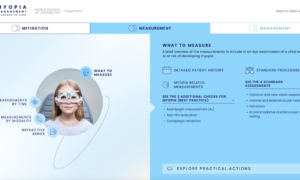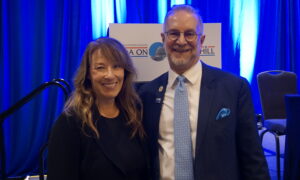March 1, 2024
By Dwight Akerman, OD, MBA, FAAO, FBCLA, FIACLE
Myopia is becoming increasingly common among children and adolescents. Many experts refer to juvenile-onset myopia as a pandemic. As an eye care practitioner, it’s crucial to understand that parents play a significant role in myopia management. They make the final decision about their child’s treatment, control the entire process including finances, and often ask insightful questions. However, it’s vital to acknowledge that parents may feel emotional, stressed, and worried about their child’s visual condition.
Since most parents of myopic children have never heard of myopia management or the eye health dangers of myopia, excellent communication is essential to get parents to agree to your recommended treatment plan. Great eye care practitioners communicate in a clear, concise, and easy-to-understand manner. They listen to patient and parental concerns, answer questions, and stay on schedule. Using highly trained staff members to reiterate your key messages and answer further questions can streamline the conversation. Designating a staff member as the practice “myopia champion” is a best practice.
It’s important to avoid using scare tactics to compel parents to sign their children up for treatment because parents often feel guilty for passing down myopia to their children. Instead, eye care practitioners should reassure parents that juvenile-onset myopia can be managed. With proper management, it’s possible to slow myopia progression significantly. Educating parents about the available evidence-based treatment options and the benefits and risks of each option is vital. This helps them make an informed decision and feel confident about their choice.
Parents don’t want to be overwhelmed with information. Successful myopia practitioners understand that every parent is different and has unique communication preferences. Pre-written text messages, emails, brochures, websites, or videos are commercially available to assist you in educating parents and motivating them to say “YES” to your recommendations. Always ask parents how they prefer to communicate and adjust your communication style accordingly.
It’s also crucial to communicate the long-term benefits of myopia management to parents. Myopia is a progressive condition, and if left untreated, it can lead to serious eye problems later in life, such as cataracts, glaucoma, myopic macular degeneration, and retinal detachment. By managing myopia in childhood, we can reduce the risk of these complications and improve the child’s quality of life. Parents and children must understand that myopia may continue progressing while undergoing myopia therapy. Ensure that the parent and child appreciate that the myopia treatment may not stop axial length or Rx from changing until the late teenage years but is designed to keep them from significantly progressing.
You can have the most remarkable clinical skills in the world. However, your influence and impact will significantly diminish if you cannot persuade patients and parents to follow your recommendations.
Best professional regards,
Dwight H. Akerman, OD, MBA, FAAO, FBCLA, FIACLE
Chief Medical Editor
dwight.akerman@gmail.com














